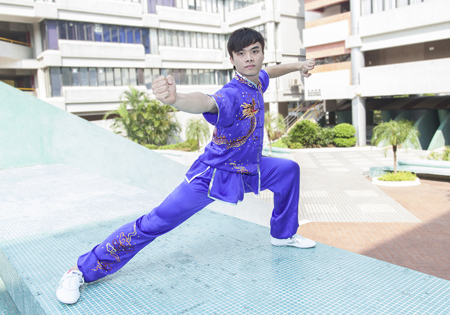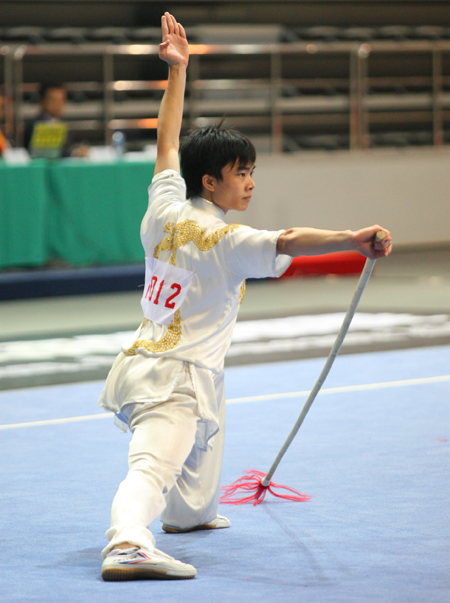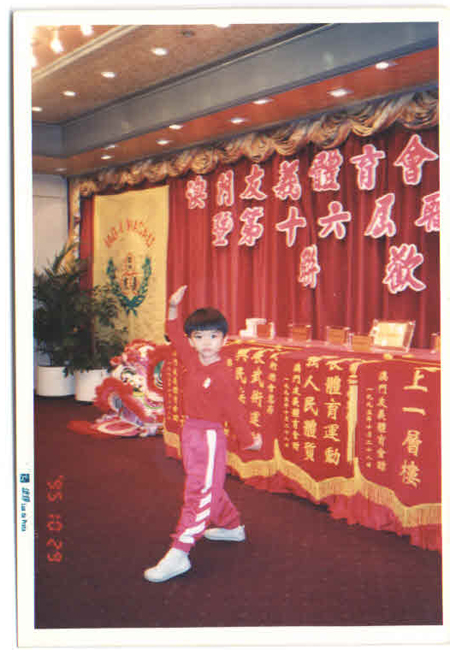At the just-ended East Asian Games held in Tianjin, Willis Chu Chi Wai, fourth-year undergraduate from the Department of Civil and Environmental Engineering, won a silver medal in the Men’s Jianshu/Qiangshu Allround category. It wasn’t the first time Willis won a medal at an international meet. Earlier he won gold medals at the World Junior Wushu Championships and the World Wushu Championships.
“Martial arts can change a person from the inside out.”
Willis was introduced to the world of martial arts at the age of four. But he says for him martial arts is an acquired taste. The boring, repetitive training in the basic moves made him give up for a time. But later, when he was ten, his father, who was a martial arts coach, founded a sports club. The passion and persistence of those club members who constantly talked about and practiced martial arts eventually won him over. His passion for this sport grew stronger after he began to win medals at various competitions. And that was also when his career as a professional martial arts athlete took off.
You’d think an experienced gold medalist like Willis would have become blasé about competing at local events, especially when the rivals were considerably younger and lesser-known. But as Willis told us, the most unforgettable experience for him was the Asian Junior Wushu Championships held in Macao. Considered the top hopeful with home advantage and a number of medals already under his belt, Willis was keen to win and perhaps a part of him also thought the medal was in the bag. Performing under enormous pressure, he made some serious mistakes, which cost him the gold. This unexpected setback jolted him back to reality. He picked himself up, threw himself into the next round, this time focused on nothing else but the competition, and finally turned the tide. That experience was a watershed in Willis’s athletic career. It taught him the danger of losing sight of what’s really important and the importance of not letting past successes become a burden. “A medal is just a mark for your performance at a single event, and after the event’s over you start over with a clean scoreboard,” says Willis. “Winning is great, but now I don’t think too much about the outcome. There are always winners and losers in a competition. The only way you can keep winning is if you never enter a competition.”
Martial arts has helped him grow up, but that’s not the only benefit Willis has reaped from this sport. He used to be a quiet, introverted boy with inborn heart disease, and practicing martial arts has helped his heart grow stronger and turned him into a gregarious person. “Martial arts really can change a person from the inside out,” says Willis.
“In the future I’ll just enjoy martial arts for its own sake.”
In his early 20s, Willis’s life is just beginning, but his professional life as a martial arts athlete has past its prime. “Being a world champion was my childhood dream, and that dream has come true, so looking back I don’t have regrets,” says Willis. “As for the future, I’m not going to tell myself how many more medals I’ll have to win; I think I’ll just enjoy martial arts for its own sake.”
Now a graduating student, Willis is at a crossroads in his life. “I used to go to Beijing for a two-month intensive training every summer holiday, but I don’t think I’ll be able to keep doing that once I get a job after graduation,” says Willis in a calm voice, something akin to longing flashing through his gaze. He has yet to figure out what he wants to do after graduation, but one thing he knows for sure is that wherever he wants to go, there is no shortcut in life, just like there is no shortcut in mastering the martial arts.



